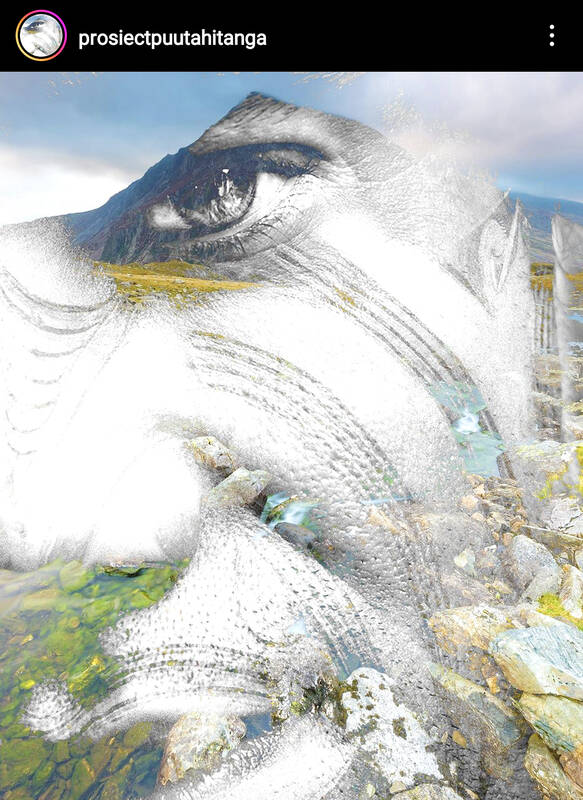They will bring heavy riffs, pounding drums and lyrics delivered with a growl — but a punk band from New Zealand arriving in Wales this week also hope to spark important conversations about what it means to create pop songs in “minority” languages.
The band Half/Time, who perform in Maori and English, will appear alongside artists and groups who sing in Cymraeg, or Welsh, as part of a cultural exchange organized by the universities of Cardiff and Waikato.
Elen Ifan, a lecturer and researcher at Cardiff University’s school of Welsh, said that on the face of it the Maori and Cymraeg music scenes might be expected to have different feels.

Screengrab: Taipei Times
“The two cultures developed on opposite sides of the world,” she said. But there are similarities. Both have grown in places subject to colonial rule and have felt the pain of having their languages suppressed. There is a surge of interest in both countries in learning the languages that were lost to many and in bands and singers who perform in their indigenous tongues.
Ifan, who plays cello with the Cardiff band Rogue Jones, who perform in Welsh and English, said the Welsh-language music scene is booming, with artists such Gwenno (who sings in Cymraeg and Cornish) winning fans around the world.
“There seems to be a new confidence in the Welsh-language scene with artists really experimenting and finding their own voice. It’s exciting,” she said. “This project is an opportunity to gather and share thoughts about what it means to perform music in a minority language.”

photo courtesy of Wikimedia Commons
Half/Time will appear at the Focus Wales festival in Wrexham on the same bill as the post-punk band Adwaith, one of the young bands whose Welsh-language songs are receiving national and international attention.
The New Zealand band accept that punk is “not necessarily” a genre of music associated with Te Ao Maori (the Maori world/worldview) but argue there are parallels such as beliefs on the importance of community and resistance.
Wairehu Grant, the band’s guitarist, who describes himself as a “dusty weirdo lurking in the depths of Kirikiriroa [Hamilton],” said the three-piece grew out of the “cosmic hellscape” of 2020 when the pandemic gripped the world, one of its intentions being to “address the lingering impacts of colonization in modern Aotearoa [New Zealand].”
Their EP, out soon, is called Scary Stories to Tell When You’re Dark, and their songs include lines such as “Come find us/Out where the industrial waste meets rural religious real-estate/In every home, between every floorboard and in every silence/You will find us there.”
Grant said: “Music has proven to be a powerful tool for engaging with the language of my whakapapa [ancestors] through performance and collaboration. It has helped to shift my headspace from one of embarrassment over my lack of knowledge, to one of hope and excitement for all that I have yet to learn.” He also said the trip was a chance to “infiltrate a dude-getting-a-pointy-crown celebration party.”
The project is called Putahitanga, a word in Maori that refers to the bringing together of a community on a similar issue, with its Instagram account featuring a striking image that melds a Welsh mountain with a Maori face.
Joseph O’Connell , a specialist in popular music studies at Cardiff University’s school of music, said there were exciting Welsh-language bands with punk sensibilities doing well such as Pys Melyn (Yellow Peas) and Breichiau Hir (Long Arms).
He said that although they were a world apart, Wales and New Zealand had “marginalized communities with languages that have been oppressed over generations.” He added: “Although thousands of miles apart, there is much that both cultures can learn from each other.”

The Democratic Progressive Party (DPP), Chinese Nationalist Party (KMT), and the country’s other political groups dare not offend religious groups, says Chen Lih-ming (陳立民), founder of the Taiwan Anti-Religion Alliance (台灣反宗教者聯盟). “It’s the same in other democracies, of course, but because political struggles in Taiwan are extraordinarily fierce, you’ll see candidates visiting several temples each day ahead of elections. That adds impetus to religion here,” says the retired college lecturer. In Japan’s most recent election, the Liberal Democratic Party lost many votes because of its ties to the Unification Church (“the Moonies”). Chen contrasts the progress made by anti-religion movements in

Taiwan doesn’t have a lot of railways, but its network has plenty of history. The government-owned entity that last year became the Taiwan Railway Corp (TRC) has been operating trains since 1891. During the 1895-1945 period of Japanese rule, the colonial government made huge investments in rail infrastructure. The northern port city of Keelung was connected to Kaohsiung in the south. New lines appeared in Pingtung, Yilan and the Hualien-Taitung region. Railway enthusiasts exploring Taiwan will find plenty to amuse themselves. Taipei will soon gain its second rail-themed museum. Elsewhere there’s a number of endearing branch lines and rolling-stock collections, some

Last week the State Department made several small changes to its Web information on Taiwan. First, it removed a statement saying that the US “does not support Taiwan independence.” The current statement now reads: “We oppose any unilateral changes to the status quo from either side. We expect cross-strait differences to be resolved by peaceful means, free from coercion, in a manner acceptable to the people on both sides of the Strait.” In 2022 the administration of Joe Biden also removed that verbiage, but after a month of pressure from the People’s Republic of China (PRC), reinstated it. The American

This was not supposed to be an election year. The local media is billing it as the “2025 great recall era” (2025大罷免時代) or the “2025 great recall wave” (2025大罷免潮), with many now just shortening it to “great recall.” As of this writing the number of campaigns that have submitted the requisite one percent of eligible voters signatures in legislative districts is 51 — 35 targeting Chinese Nationalist Party (KMT) caucus lawmakers and 16 targeting Democratic Progressive Party (DPP) lawmakers. The pan-green side has more as they started earlier. Many recall campaigns are billing themselves as “Winter Bluebirds” after the “Bluebird Action”